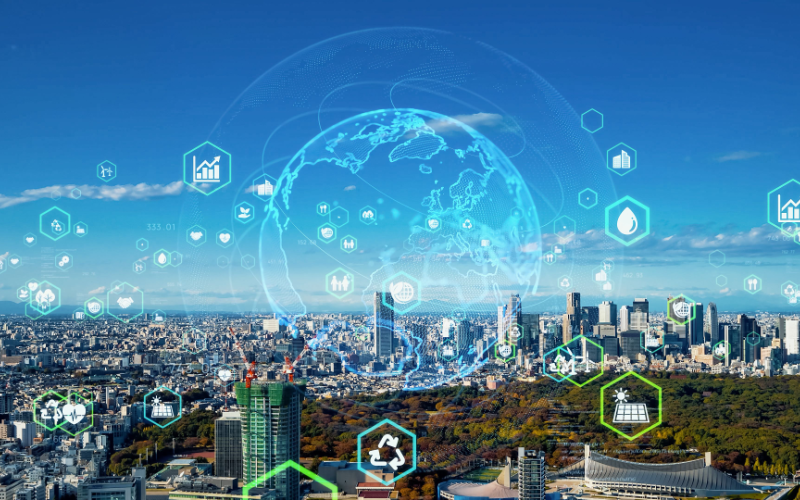Better Together: “The Promise of Supply Chain Sustainability”
How are global business leaders looking to warranty business continuity, growth and profitability by embedding effective and enduring sustainable practices in supply chain design, operations and performance management? That is what the State of Supply Chain Sustainability report has looked at for the last three years. As a report sponsor, we were honored to participate in an in-person event hosted by the MIT Center for Transportation and Logistics and CSCMP, the report authors. As I mentioned in my previous blog, one of the things we are focused on is making a better effort in community building with more customer-focused events.
“The Promise of Supply Chain Sustainability: Trending and Future Applications for Business” event looked at how the practice of supply chain sustainability (SCS) is evolving globally and how it is driving change across business functions. It also examined how the COVID-19 pandemic impacted, if any, companies’ sustainability efforts, and what it implies for approaches to future global disruptions.
Blue Yonder’s Shri Hariharan, CVP, Industry Strategy, was joined by other report sponsors including: Delma Ramirez, Principal, Sustainability & ESG, at Avetta; Rachel Schwalbach, VP, ESG, C.H. Robinson; and Christian Piller, VP, Research& Sustainability, at project44. David Correll, Research Scientist at MIT CTL, hosted the roundtable discussion.
Some of the major takeaways from participating in this event virtually, as well as talking to our customers, include:
- The COVID-19 pandemic did not derail sustainability efforts in supply chain. If anything, it gave companies more leeway to adapt their supply chains.
- The importance of sustainable practices rose year-over-year in ALL segments, including investors, consumers, private equity, employees, etc. This shows that sustainability concerns are only growing.
- Where product sustainability (i.e., where the various parts were sourced, what are they made of, etc.) is scrutinized, the same scrutiny is not uniformly applied to the supply chain that got the goods to the shelves. This is bound to change, and soon.
- Companies will continue to focus on energy, climate change, biodiversity, and the idea of circularity.
- One company’s recent journey in circularity was highlighted in the conversation – Decathalon, a French sports apparel brand, reversed its name (to Nolhtaced) to promote a „reverse shopping“ initiative in Belgium; consumers in that country can sell their sporting products to the company, which will then repair and resell the items with a warranty.
- There was an open discussion raised by a participant about the role of individuals as consumers to align habits, behaviors and actions in support of reducing waste. For example, would we be willing to wait an extra day or two for our online orders to be delivered if we were to understand the impact of the decision on sustainability metrics?
Blue Yonder is seeing much of this already in conversations with our customers and partners. We are working hard to help our customers meet their sustainability needs. For example, Shri shared the story of Driscoll’s, which produces and distributes fresh food products like strawberries. In a recent Blue Yonder-hosted webinar “6 Supply Chain Imperatives To Deliver Sustainable Business,” Driscoll’s Sankar Chinnathambi, VP – Global Applications & Data, spoke about why sustainability is important to the company. Berries are a delicate product and are transported in a plastic clamshell that protects the fruit; however, this uses a lot of plastic. As an organization they are looking to reduce plastic use and have started with paper packaging that uses a plastic wrapper, reducing plastic by 94%. The company’s goal is to hit 50% of all packaging in European markets by 2023.
Driscoll’s is also a big consumer of energy because of their cold chain; they have to keep the fruit cool in coolers. They have started to reduce energy consumption by converting one cooler to be solar power operated and it has reduced energy consumption by 32%. They are looking to convert other coolers in the near future. And thanks to their work with Blue Yonder, they have been able to digitize their logistics processes, removing hard copy paper from the process. This has not only eliminated waste but also improved the life of its workers who can track everything digitally without the fear of lost paperwork.
There is also our customer Diageo, who is using our Luminate Control Tower to predict and plan warehouse capacity and efficiencies up to three months in advance, giving their teams the time to manage common challenges like port congestion. As a result, they have reduced their spend on air freight, a costly remedy for shipping delays, by almost 90%. This also helps lower their carbon footprint.
Another customer, Bayer Crop Science worked with Blue Yonder to implement a single transportation and logistics platform — with shared data, metrics, workflows and best practices — across more than 350 locations worldwide, supporting the company’s goal for global standardization. The result was a reduction in miles traveled and related environmental impacts, as well as 3-5% savings in overall transportation spend helping to improve costs and lower their carbon footprint.
As sustainability moves to the forefront of supply chain, Blue Yonder and our ecosystem partners are engaging with the industry to drive re-imagined processes, ways of working and data-driven, digital approaches to instill and sustain effective change. We are all connected by our sense of purpose, it inspires us to build a more sustainable future for all.
Learn more about how Supply Chains Can Save the World, and watch a replay of the MIT CTL webinar.

